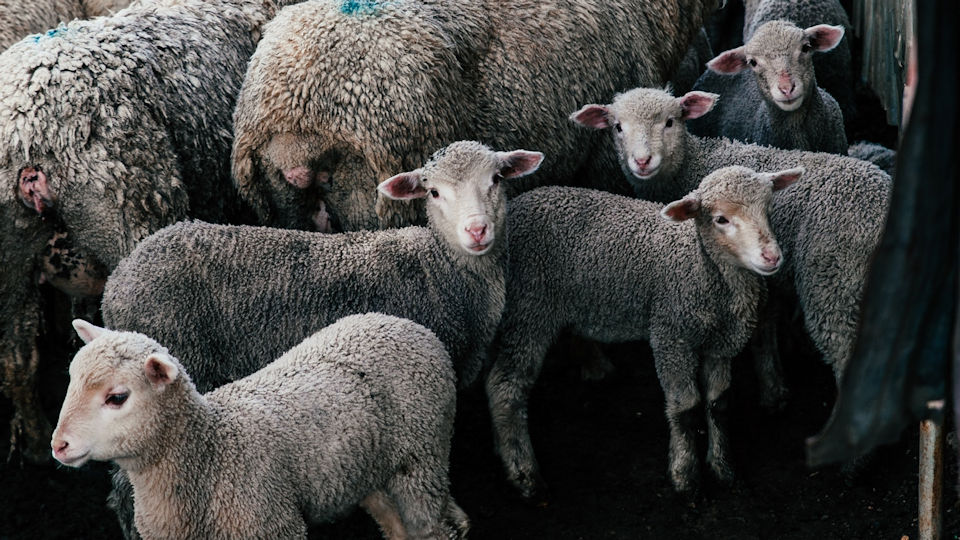When they had finished eating, Jesus said to Simon Peter, “Simon son of John, do you love me more than these?” “Yes, Lord,” he said, “you know that I love you.” Jesus said, “Feed my lambs.” John 21:15 (NIV)
I could not believe what I was hearing; a pastor was telling, perhaps even bragging, that in his church, he preaches only the meat of the word, never milk. Maybe he was trying to say that he never compromised the truth of Scripture, but it did not sit well with me. I wondered if he had any recent converts in his church. I imagined the absurdity of feeding a baby a T-bone steak.

In John 21, we see the threefold appeal to Peter by Jesus. Some commentators believe that Jesus queried Peter three times, corresponding to the number of times that Peter denied him. In each case, the charge to Peter changes slightly. Jesus begins, “feed my lambs.” A lamb is young and innocent and requires different care than mature sheep. Secondly, Jesus says, “take care of my sheep.” Caring for the sheep encompasses more than just feeding. It is complete care. Finally, Jesus exhorts, “Feed my sheep.”
The bottom line is this: if we love Jesus, we will feed and take care of his sheep, young and old. Literally and metaphorically, sheep require devotion.
The Care and Feeding of Sheep
He makes me lie down in green pastures... Psalm 23:2 (NIV)
A shepherd is responsible for the care and feeding of the sheep. Sheep do not fare very well when left to themselves. They are not very good at finding their own food. They have a miserable sense of direction. And when they are on their own, they are easy prey for predators. Sheep need shepherds!
With natural sheep, the shepherd has the authority and the tools (a staff and perhaps a sheepdog) to enforce his will upon the sheep for their benefit. Spiritual sheep often pick their shepherds. Sometimes they go from shepherd to shepherd, seeking one who will please them. This poses a real problem; does a shepherd do what is best for the sheep or what will keep them from leaving for “greener pastures?” At times it seems there is very little loyalty.
How do we solve the dilemma of providing our people what they need instead of what they want? It is not uncommon for pastors of smaller or struggling congregations to complain that larger, seemingly successful ministries serve “junk food.” What can you do when sheep have a sweet tooth?
The Right Sheep?
As pastors, we are sometimes guilty of evaluating potential sheep. I am sure I am not the only pastor who has looked at visitors on a Sunday morning appraising their potential. Some may look nice enough, but we are unaware of why they left their last church. And others come who make us wary. Some will come wounded and hurt, while others are wolves dressed as sheep.
Catering to sheep who have developed a taste for something other than “the pure milk of the word” or “the solid food of the mature” is asking for trouble. These “church shoppers” will never be satisfied short of divine intervention. There is also the potential of infecting the flock with all sorts of trouble.
Transferring sheep may sound appealing but beware. God may send you mature believers who will be of great help but always exercise caution. It is noteworthy that the New Testament talks about the shepherd searching for the lost sheep. Jesus declared: “For the Son of Man came to seek and to save the lost” Luke 19:10 (NIV). But nothing is said about what to do with sheep who wander in from another sheepfold.
The Good Shepherd
“I am the good shepherd. The good shepherd sacrifices his life for the sheep. A hired hand will run when he sees a wolf coming. He will abandon the sheep because they don’t belong to him and he isn’t their shepherd. And so the wolf attacks them and scatters the flock. The hired hand runs away because he’s working only for the money and doesn’t really care about the sheep. John 10:11–13 (NLT)
To be a shepherd of God’s people is a high calling. In John 21, Jesus connected the care and feeding of his sheep as evidence of our love for him. Jesus is the Good Shepherd, and we are to follow his example as under-shepherds. We follow his pattern.
We are to provide nourishment appropriate to their level of maturity. We may not be able to separate the sheep from the goats at this time, and constant diligence is required because of threatening wolves.
We hear of increasing numbers of pastors leaving the ministry each year. It is a challenging calling. Sheep can break your heart. There are many pressures and challenges that confront us.
Care for the flock that God has entrusted to you. Watch over it willingly, not grudgingly—not for what you will get out of it, but because you are eager to serve God. Don’t lord it over the people assigned to your care, but lead them by your own good example. And when the Great Shepherd appears, you will receive a crown of never-ending glory and honor. 1 Peter 5:2–4 (NLT)
To each one of you who is serving as a pastor in some capacity, your faithfulness will be rewarded. Keep looking for the sheep who are lost. Jesus is saying to each one of us today, “feed my lambs.”
Steve Ekeroth
Photo by Rachel Claire from Pexels